Mining Concessions for the Medan Block
The term “Medan Block” emerged during the trial of former North Maluku Governor, Abdul Gani Kasuba. Medan Block is believed to refer to pre-allocated nickel mining concessions in Halmahera.
maaf email atau password anda salah
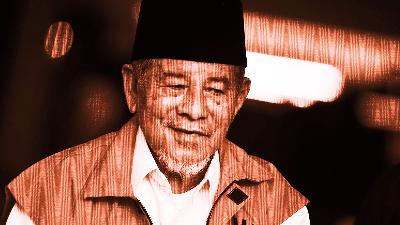
The term “Medan Block” emerged during the trial of former North Maluku Governor, Abdul Gani Kasuba. Medan Block is believed to refer to pre-allocated nickel mining concessions in Halmahera.

Bobby Nasution is suspected of managing the Medan Block nickel mine since 2021. He met with Abdul Gani Kasuba before becoming the Mayor of Medan.

Entrepreneurs are pressured by the mandatory halal certification regulations. The costs associated with obtaining halal labels are considered expensive, and the procedures are complicated.

President Jokowi entrusted his confidants to join Prabowo’s cabinet. Several ‘volunteers’ also received positions.
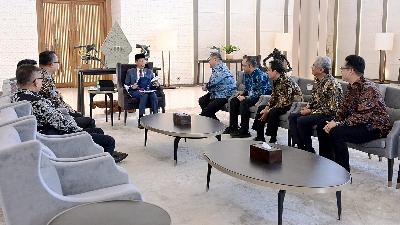
Various parties from the National Police Chief to the State Palace are accused of interfering in the KPK leadership candidates selection process. The candidates are divided into four clusters.
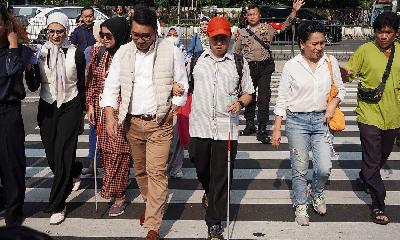
Jakarta governor and deputy governor candidates promise improvements in inclusive public transportation.
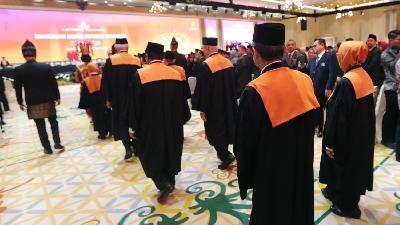
The race for the position of Chief Justice of the Supreme Court is heating up amid a flurry of allegations against certain candidates. There is suspicion of backing from business circles.

Using a variety of pretexts, the political parties replace elected legislative candidates. This is a betrayal of the people’s choice.

Gubernatorial candidates are trying to win over the votes of Anies Baswedan supporters in the Jakarta regional election. Jokowi reportedly shifted his support.

Pramono Anung and Ridwan Kamil shed light on the dynamics surrounding their appointments as Jakarta gubernatorial candidates.
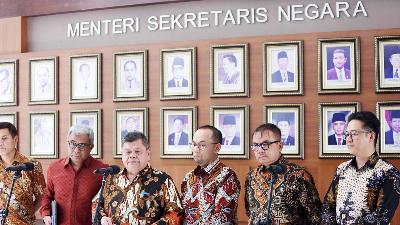
News summary on the conflict of interest of KPK leadership candidates and 44 ministries in Prabowo’s government.
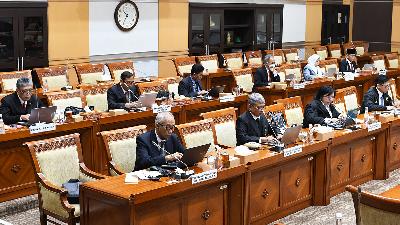
Commission III of the House of Representatives rejected all the Supreme Court judge candidates proposed by the Judicial Commission. The rejection allegedly was due to their favored candidate failed to pass.

The government plans to liquidate Jiwasraya after the settlement of policyholder claims. A massive deficit still hangs over the company.
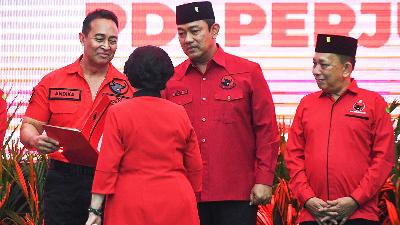
The Indonesian Democratic Party of Struggle (PDIP) strives to counter candidates supported by the Palace. It is an early projection for the 2029 General Elections.
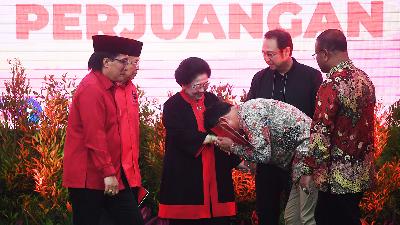
The PDI-P will be nominating Anies Baswedan in the Jakarta gubernatorial election. A popular candidate against Jokowi’s coalition.

Jokowi is believed to have intervened in making Bahlil Lahadalia general chairperson of the Golkar Party.

The 2025 State Budget accommodates several of Prabowo Subianto’s programs. Lobbying efforts are underway to ensure the smooth implementation of these priority programs.
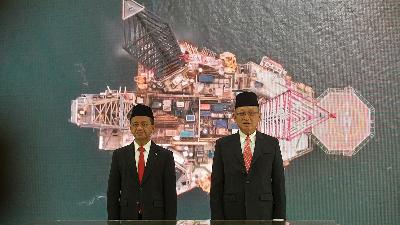
Just months before the end of his term, Jokowi appointed Bahlil Lahadalia as Energy and Mineral Resources Minister. The position is considered prone to conflicts of interest.
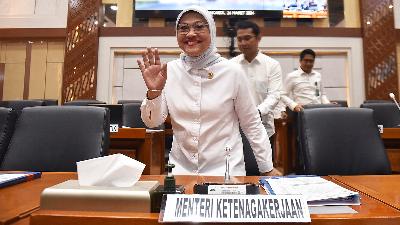
Minister of Manpower Ida Fauziyah explains the issues surrounding the mass layoffs in the industrial sector.

The opportunity for Anies Baswedan to contest the Jakarta gubernatorial election is slipping away after the coalition of parties supporting him fell apart. There is a guerrilla from the Palace.

An exclusive Tempo interview with Anies Baswedan regarding his chances to run in the Jakarta regional head election.

Jokowi and Prabowo’s coalition are maneuvering to thwart Anies Baswedan’s candidacy in the Jakarta regional head election. Cabinet posts are being offered as inducements.

The battle in the presidential election is set to continue in regional head elections. The PDI-P is determined to challenge President Joko Widodo’s candidates.
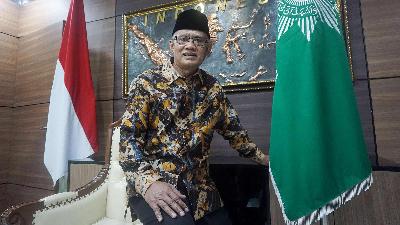
Muhammadiyah follows Nahdlatul Ulama’s step to accept mining concession offer from the government. Muhammadiyah General Chair Haedar Nashir explains about it.
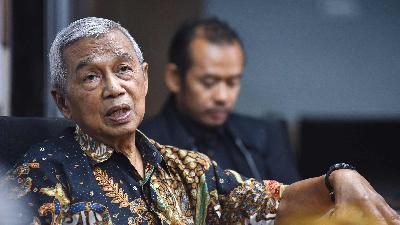
Muhammadiyah accepts the government’s mining concession offer. Many members are against it. Busyro Muqoddas, Chair of Muhammadiyah’s Law and Human Rights Council explains.

Right of replies of universities and assessors on the investigative report on the professorship scandal.

The professorship of various public figures and officials appear to be problematic. Their titles were earned thanks to certain assessors and predatory journals.

Chances for Anies Baswedan to run in the Jakarta regional head election are beginning to open up. A number of political parties support Prabowo Subianto intend to nominate Anies.
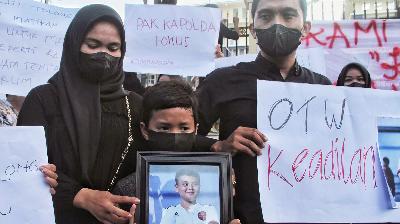
Thirteen-year-old Afif Maulana was found dead under a bridge in Padang, West Sumatra. He had allegedly been tortured by the police.

PKB General Chair Muhaimin Iskandar explains the odds of his party joining Prabowo Subianto’s coalition.

Many Islamic boarding schools are operating without permits. There needs to be standardization of these religious educational institutions.
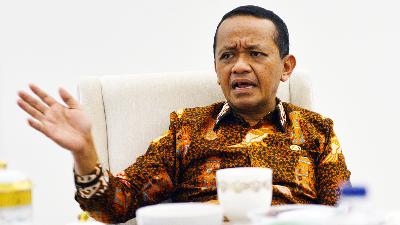
Interview with Minister of Investment Bahlil Lahadalia about mining business permits IUP for mass organizations, and the debate with Luhut Pandjaitan.
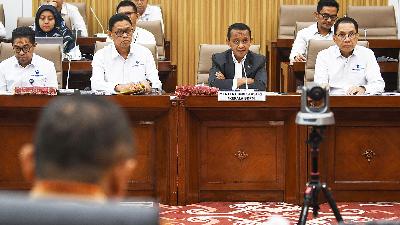
The role of Bahlil Lahadalia in revoking mining business licenses draws attention of the House of Representatives and civil society groups, amidst concerns of possible licensing corruption.

The number of Indonesian umrah minor pilgrimage travelers grows during the fasting month of Ramadan. The nation’s umrah economic potential has not been fully harnessed.

Bahlil Lahadalia explains the uproar over the revocation of mining permits as well as alleged extortion of money and shares in exchange for reinstatement of the permits.
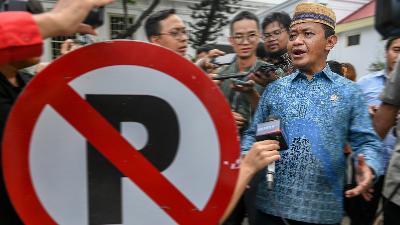
Bahlil Lahadalia has a glimmering political and businees career. He is aiming for Golkar Party’s top position.

A defendant of the Supreme Court justice bribery case is allegedly subjected to extortion by someone claiming to represent the leadership of the KPK. The name Firli Bahuri is also implicated.
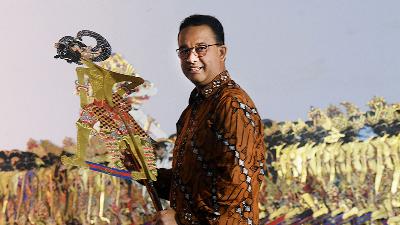
Anies Baswedan talks about the campaign. He admits there are talks with the Ganjar-Mahfud team.

The claim that the Gunung Padang site is the oldest pyramid in the world is strongly challenged. A collaboration of researchers from around the world is needed.

Merlinda Dessy Arantji Adoe successfully pulled off a role with difficult depth. She is a brilliant newcomer.

Foreign archeologists doubt the site of Gunung Padang as the world’s oldest pyramid. A journal publisher is going to investigate.

Moh. Wijdan, Head of Ketapang Jaya village, Ketapang, Sampang, East Java, replies to Pressure from the Police and Prosecutors article.

The presidential and vice-presidential candidates are relying entirely on gimmicks to exploit the emotions of the people. This moves the campaign away from substantive discussions.

Anies Baswedan is campaigning aggressively through TikTok. It is forbidden to talk about politics and campaigns.

Do the presidential candidates succeed in attracting young voters with social media gimmicks?

Acts of intimidation are being aimed at people critical of the government. Even art events are not exempt from censorship.

Moeldoko has reportedly sent letters to various government officials to clear Wuling’s GB/T charger for the Indonesian National Standards.

The presidential candidates’ campaign teams are an illustration of the type of government they would form if elected. Businesspeople have a central role.
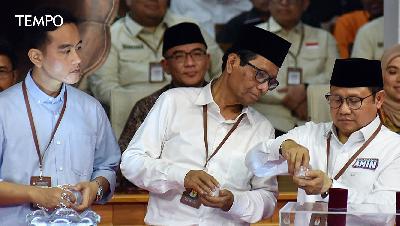
In Indonesia, presidential candidate debates are planned as bogus performances. There is no in-depth discussion of the issues.

Having no democratic legitimacy, Gibran Rakabuming Raka must withdraw his candidacy for the vice-presidency.

Constitutional Court Chief Justice Anwar Usman is reportedly maneuvering to lower the minimum age limit for presidential and vice-presidential candidates, paving the way for Gibran.
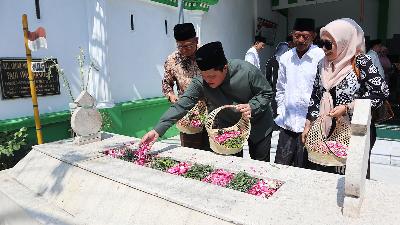
Erick Thohir and Airlangga Hartarto are maneuvering to be chosen as Prabowo’s running mate in the 2024 presidential election. They are up against Khofifah Indar Parawansa.
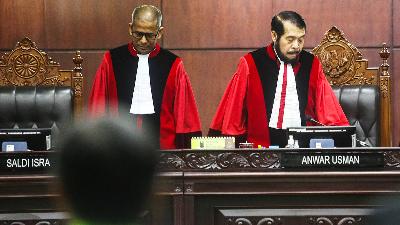
The Constitutional Court reportedly already made a decision in favor of a lawsuit regarding the minimum age requirement for presidential and vice-presidential candidates. The issue is rife with conflicts of interest.

Presidential candidates’ supporters are creating unfavorable atmosphere in the build-up to the 2024 general elections with them more inclined to speak about rivals’ weaknesses than promoting their champions’ profiles.

The 2024 presidential candidates are competing to garner support from retired generals. This perpetuates the militaristic nature of Indonesian politics.

Several high-ranking veterans formerly supporters of Jokowi and Prabowo switched their allegiance to Anies Baswedan. Several officers held disappointment.
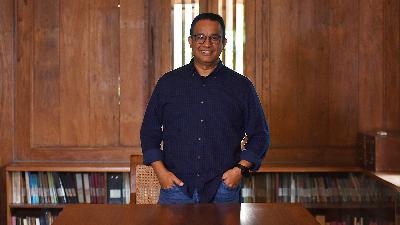
Presidential hopeful Anies Baswedan on the Change Coalition’s compelling needs to choose Muhaimin Iskandar over Agus Harimurti Yudhoyono.
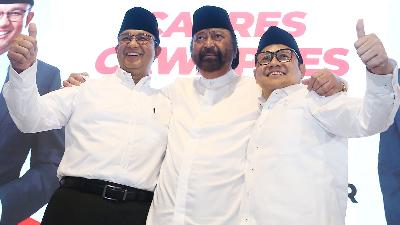
Anies Baswedan choses Muhaimin Iskandar to be his vice-presidential running mate. Agus Harimurti Yudhoyono is eliminated in the final turn.

Anies Baswedan’s presidential running mate, Muhaimin Iskandar, was embroiled in several corruption cases. Yet, he is determined to run for vice-presidency.

Top management of Bank Mayapada allegedly obtained kickbacks from customer credit disbursements. The OJK was lax in their oversight of this bank owned by a member of the Presidential Advisory Council.

Garuda Indonesia announces its biggest ever profits. It hinges on negotiating postponement in paying its bills.

Four months before the start of official presidential candidacy, all coalitions still try to find their best footing. They are calculating electoral benefits.

Jokowi seeks to determine the candidates who will run in the 2024 General Elections. He encourages Sandiaga Uno and Erick Thohir to become vice-presidential candidates.
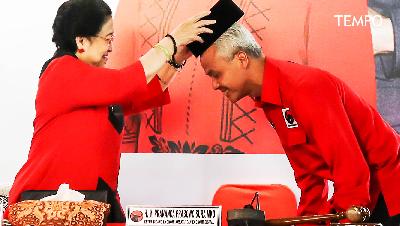
Ganjar and other presidential candidates must side with the people. Even if they have to go against the wishes of their parties.

Vice-presidential candidates will determine who will be the 8th President of Indonesia. Why?
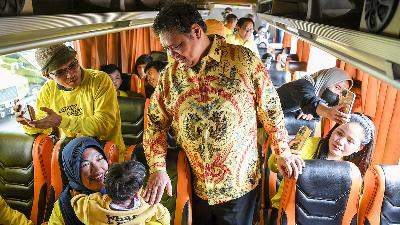
Presidential candidates and politicians are busy providing free mudik homecoming trips. They are willing to outlay billions of rupiah.
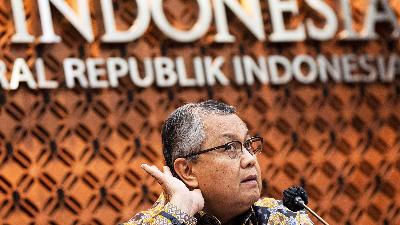
Sri Mulyani was included as a candidate for governor of Bank Indonesia. After getting some new whispers, Jokowi chose Perry Warjiyo again.

Prospective presidential candidates are being pragmatic in choosing their running mates. Electoral interests are the only consideration.

Juanda Airport escalators are often unusable.

The concept of Kampung Madani is to optimize the business and economic potential of the region. #InfoTempo

Vanda International Science Competition focuses on the student’s ability to think critically and creatively to pick out hidden information to aid them in solving the question. #Infotempo
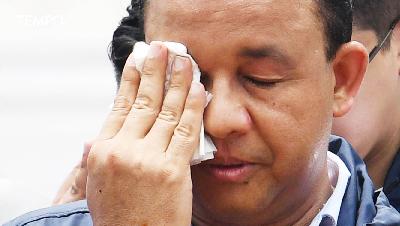
While Ganjar Pranowo has yet to attain his ticket to join the election, Anies Baswedan faces imminent failure in his bid for presidential candidacy as he gets mired in a tug-of-war for a vice-presidential candidate. Beware of signs of trickery by political jesters.

Anies Baswedan is courted by party cadres and officials joined under the United Indonesia Coalition. Ganjar Pranowo is also being considered.

The NasDem Party announces that Anies Baswedan will be its presidential candidate. In the brutal world of interest politics, can Anies avoid repeating Jokowi’s mistakes?
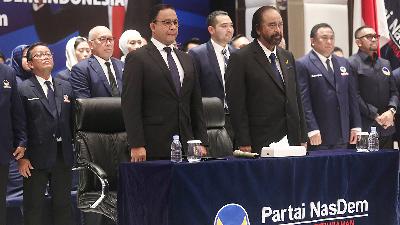
The case of suspected corruption involving the holding of Formula E race led the NasDem Party to move up the date they announced Anies Baswedan as their presidential candidate.
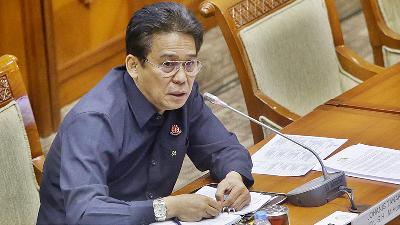
Weekly news capsules, from two candidates for Lili Pintauli Siregar’s replacement to the arrest of Supreme Justice Sudrajad Dimyati.

The Sahendaruman Protected Forest is under threat of destruction by a gold mining company. The forest is a source of water, a buffer against natural disasters, and the habitat of several endangered endemic bird species.

The government is to inject Rp7.5 trillion of fresh funds into Garuda Indonesia. This has the risk of turning into a long-term burden.

Garuda Indonesia is waiting for state capital injection and new investors after escaping a bankruptcy lawsuit. They convert debts to stocks, removing inefficient flight routes, and reducing fleets.
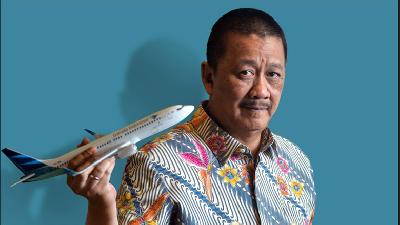
Garuda Indonesia CEO Irfan Setiaputra explains the various efforts taken to save the national flag carrier after signing the debt postponement. A change in corporate culture is needed to prevent the recurrence of corruption and scandals.

The reasons why the number of golput (nonvoters) in the general elections is always high. It is necessary to accommodate individual candidates.
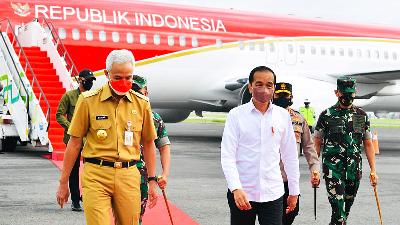
The relationship between Joko Widodo and the PDI-P is strained due to signals of support for Ganjar Pranowo. The party is looking at potential presidential candidates besides Puan Maharani.

Returning home for the end-of-fasting-month Ramadan holidays, or Lebaran, should be a pleasant journey. Follow the rules and be well prepared.
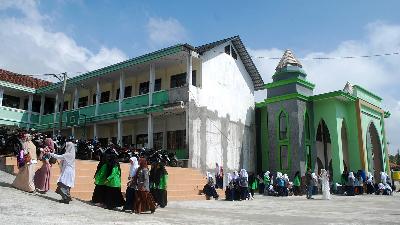
The Nurulhuda Pesantren in Garut stands by students who became victims of sexual violence. They include gender equality and sexual violence issues in the curriculum.

The river in Mandailing Natal, North Sumatra, is contaminated. There is no action from the government.

Jokowi’s style of developmentalism ignores the people and the environment. The Bener Dam in Purworejo will become its monument.

Some villagers in Wadas have been fighting against the plan to mine andesite in the village for years. These protestors and the activists assisting them have been subject to various efforts to intimidate.

The construction of the Bener dam is in breach of a number of regulations, and might even be a violation of the Constitution. It is not right to use repressive measures against people opposing a development project.

President Joko Widodo is considering candidates for the Capital City Authority chief. He reportedly offers the position to West Java Governor Ridwan Kamil. The PDI-P has its own candidates.

The government is insistent on excavating andesite rock in Wadas village. Opening the mine to build a dam altered the zoning regulations and ignores potential landslides.

Digital disruption is pushing the music recording industry to adapt in order to develop their businesses. It offers opportunities for independent musicians.
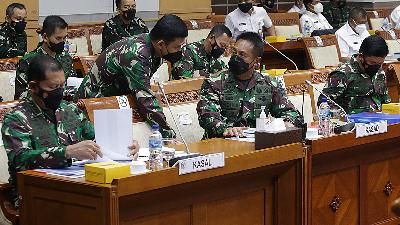
DPR’s discussion on the candidates for TNI commander intensifies. The 2024 general elections becomes one of the deciding factors.

A family of Sumatran tigers died after being caught in snare traps in Aceh. With a population of about 600, this endangered wild animal is threatened by poaching, loss of habitat, and conflict with humans.

Sunda Hejo was started by a group of people concerned about their environment in Garut, West Java. Now it runs a coffee cooperative that breaks through international markets.

Poaching produce in the North Natuna Sea is not only triggered by economic need. According to the Director of the Fleet Monitoring and Operations of the Marine and Fisheries Resources Directorate-General in the Maritime Affairs and Fisheries Ministry, Pung Nugroho Saksono, a conflict similar to the Sipadan-Ligitan case between Malaysia and Indonesia should not be allowed to recur.

Solidarity appears sporadically in the midst of an explosion in the numbers of Covid-19 cases. It needs to be supported with examples of cooperation among the elites.

Garuda’s financial problems must be resolved based on careful commercial considerations. Liquidation of the state-owned airline would not be the end of the world.
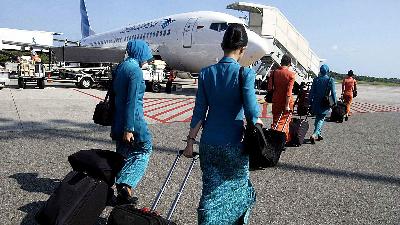
A massive financial crisis is forcing Garuda to downsize its workforce. Many expenses can be reduced.

The government is making plans to bring out flag carrier Garuda Indonesia from a critical situation, threading a steep path between mountains of debts to many creditors.

Grab is preparing a scenario to list in Nasdaq, aiming for a proceeds of Rp65 trillion to fund its ambition to become Southeast Asia’s number one super app.

Jamaah Islamiyah members—recruited from various channels, such as universities and charity organizations—are using businesses to raise funds. Two JI members confess to Tempo.

The implementation of sharia principles Tangerang General Hospital is a discriminative practice. It has been prompted by guidelines from the Indonesian Ulema Council.

Support for regional regulations with Sharia nuances is laden with electoral interests.

The trend for giving alms and charity donations via digital platforms has attracted new donors and boosted the amount of contributions. Islamic jurisprudence, or fiqh, is no longer a problem.

The idea to implement cost-sharing schemes in the National Health Insurance program managed by the Social Insurance Agency (BPJS) was brought up in a plenary session at the House of Representatives (DPR) in November.

Muslim-majority countries are scrambling to get investors in sharia capital markets. Indonesia wants to collaborate with Dubai in building a sharia stock exchange.

Intervention by State-Owned Enterprises Minister Rini Soemarno has delayed the revision of two regulations aimed at boosting efficiency in the telecommunications sector. Industry players are divided on the question of compulsory network sharing.

THE doors at a sundries shop painted orange on Jalan Asir-Asir, Lut Tawar District, Central Aceh Regency were tightly closed. The owner of the shop-Mak Cak-has not appeared for two months. "Mak has returned to Medan," said Ati, 53, the shop's assistant.
Mak Cak, 60, returned to Medan after being publicly whipped with a rattan switch in the Central Aceh Arts & Sports Building in Takengon. The Takengon Sharia Tribunal found her guilty of storing and selling liquor (khamar), sentencing her to 30 lashes minus two lashes for the 47 days she was in jail.

AIDUL Fitriciada Azhari, 48, turned out to be the dark horse in the search for a chairman of the Judicial Commission. He was a last-minute entry after the House of Representatives' (DPR) law commission rejected two of the candidates, and he got the job. "I wasn't even under consideration so it was just pure chance," said Aidul at his Jakarta office last week.
He is now responsible for completing the work to be done by the commission, from reinforcing its legitimacy to ironing out relations with the Supreme Court and addressing the problem of judges' safety. "All this is to protect the integrity of the judiciary," he told Tempo reporters Tulus Wijanarko, Fransisco Rosarians and Raymundus Rikang.

On September 28, Tri Rismaharini must give up her job as mayor of Surabaya city to an acting mayor appointed by the East Java Governor Soekarwo. That will be the end of her term.
Her bid re-election did not go smoothly. It was not because she failed to lead and develop Surabaya. In fact she did them so well that she became very popular, scaring away other challengers. So far she and Whisnu Sakti Buana are the sole contenders.

Twenty-two year old college student Irene Kharisma Sukendar did it again. In early February, she was in the Russian capital of Moscow to compete at the 2015 Moscow Open Students Grand Master tournament. And she won.
Out of the nine rounds of chess tournaments she has played since January 31, Irene managed to garner 7.5 points (6 wins and 3 draws), beating out other students from Russia, Hungary, Kazakhstan, Azerbaijan, Poland and Mongolia.

Surabaya has become beautiful and tidy. If the city still floods, the water takes only a night to recede. Traffic has improved. New parks and sidewalks have been developed.
For Surabaya Mayor Tri Rismaharini, 53, no matter how well a park is developed, if its footpaths are damaged and traffic congested, it will not be of any use. Therefore, architects like Risma, as she is known, need to think about a city's people, not merely its physical structures. "Surabaya is always in here," Risma said, pointing to her head during an interview last week.

For Azi Rianto, something was missing. The 26-year-old had been working in the information technology division at Medan State Polytechnic for three years. But he felt it was not his true calling. Music, especially the guitar, was his real love. "But my family wondered how I would make a living doing that. There is no future in it," Azi said. Medan's music scene left a lot to be desired. There were fewer bands than in Jakarta and other large cities. "My friends said that at best, musicians here end up becoming teachers if they want to earn money."
Azi received some clarity two years ago. He attended a free music class organized by Akademi Berbagi (the Sharing Academy). The speaker was Widi Asmoro, a practitioner in music and entertainment. Widi explained the ins and outs of the music industry and opened Azi's eyes. "I learned that music is not just about playing a musical instrument. There are many other people working behind the scenes," he said.

MAINTAINING that it was a big sacrifice, Mayor of Surabaya Tri Rismaharini finally closed down the legendary red light districts of Gang Dolly (Dolly Lane) and Jarak, located in the city's Putat Jaya district. The closure was executed symbolically, through a declaration signed by hundreds of approving citizens. Those who opposed the closure, took to the streets to protest.
Risma now admits that when she was first pressured into closing Dolly she actually refused. Her reasoning at the time was that the administration lacked the resources to provide the sex workers and their pimps the compensation in exchange for giving up their livelihood. But she agreed that the chain of prostitution in the city must be broken, particularly as it increasingly involved the trafficking of children. Saving the children became her main concern for closing down the area.

Kaharingan, a faith of Central Kalimantan, has long been lumped with Hinduism for bureaucratic purposes. Now its adherents are moving to break away.

Marzuki Alie and a number of Islamic scholars have been implicated in a scam allegedly committed by GTIS. The Indonesian Council of Ulama endorsed this business by giving it a sharia label.

Ever since high school, Saniah had always wanted to be a journalist. I want to see changes," said the 39-year-old activist, who was born and raised in the once strife-torn, resource-rich province of Aceh. She is one of nine siblings whose mother continues to push her cart daily, peddling fresh cuts of beef around her village, just outside of Lhokseumawe town. Lacking funds to go to university, Sania went to neighboring Malaysia as a migrant worker at 18, returning six years later to enroll for journalism classes, earning a degree in 2005. She plunged enthusiastically into a career mired in political challenges and full of social taboos, in Sharia-based Aceh.

Tired of working as a building contractor, Djuhhari Witjaksono turned to the craft of creating miniature ships. His work has won recognition from UNESCO.

Moderate Islamist Party Ennahda is ahead in Tunisia's election. The party promised not to impose sharia laws on a moderate Islamic society.

Sharia-based regulations in Dompu, West Nusa Tenggara, originally adopted for political reasons, are no longer strictly enforced.

A number of regions are competing to issue sharia-based regulations, although they may be political tools to amass funds and votes.

The area covered by Sharia is spreading wide. It is more effective on the lower layers of society but has little impact on the wealthy and the elite.

CVC Capital has taken over the majority shareholding in the Matahari Department Store from the Lippo Group. However, many doubt that the group really released one of its cash cows.

Dozens of people died over a charity handout. No coordination with police.

Fajar Taslim, said to be a pupil of Dr Azhari the bomb maker, was arrested after the Singapore government sent a red notice.

A well-known 'motivator' threw millions of rupiah out of an airplane. This is an insult disguised as charity.

Bhairawa, the frightening giant of a statue, is a centerpiece exhibit at the Jakarta National Museum, the spiritual symbol of King Adityawarman, ruler of the 14th century Kingdom of Dharmasraya in Sumatra.
Not much is known about Dharmasraya. It’s mentioned only in the inscriptions in Amoghapasa and Negarakertagama manuscripts. Dharmasraya is believed to have been a powerful kingdom, so much so that the Javanese Kingdom of Singasari sought its assistance to drive out Kublai Khan’s Mongol invaders.
Tempo’s Febriyanti recently traveled to Padang Roco on the bank of the Batanghari River, believed to be the site of the Kingdom of Dharmasraya and where the Bhairawa statue was found. Her report is complemented with an article on Ulrich Kozok, a German-born scholar who discovered an old manuscript that lifts a little of the mystery surrounding the existence of Dharmasraya.

Large banks are competing to enter the Shari’a banking business. However, the growth of assets is still low.

Companies are starting to make use of funds from the Shari’a capital market for expansion. But the value remains small.

A THOUSAND years ago, the Batanghari River brought globalization to all corners of Sumatra. Scores of ancient cultural sites were found along the rivers bank. Stretching as far as 7.5 kilometers, the Jambi estuary (Muara Jambi) is the largest. Seven hundred years later, some of the sites still lie buried underground and in the jungles, but seven sites of almost 70 temples have been restored. Tempo reporter Kurie Suditomo reports from the location.

As Sharia or Islamic Law becomes entrenched in Aceh, questions are being raised as to who benefits from it and what its impact is likely to be on the rest of Indonesia.

Four regional governments agree to the Cepu Block production sharing. Several big names continue to move closer.

Police have seized four Kuningan bombing suspects claiming to come from Darul Islam. When will Azahari be captured?

His long hair was slightly wavy and graying. He wore a haj cap casually, slanting it to the right and then to the left. Despite his sloppy look, he was hospitable and courteous. His speech was now and again philosophical. This is Kiai Haji Maksum Djauhari, leader of Pesantren (Islamic boarding school) Lirboyo in Kediri, East Java. This elderly cleric of the Nahdlatul Ulama (NU), nicknamed Gus Maksum, is as eccentric in appearance as in the way he perceives current issues. Indeed this is the case with his attitude to the crisis within the National Awakening Party (PKB), which has now split into two: the Abdurrahman Wahid (Gus Dur) camp and the Matori Abdul Djalil camp.
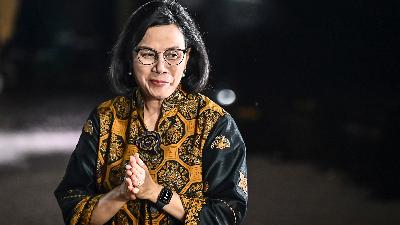
Sri Mulyani and several economic ministers from Jokowi join Prabowo’s cabinet, with encouragement from two former presidents.

Indonesia’s delegation at COP16 CBD in Cali, Colombia, is not led by a minister. Biodiversity funding is at risk of not being agreed upon.

A number of policies from Minister Sakti Wahyu Trenggono are riddled with conflicts of interest. They benefit his son, Indra Trenggono.

Explanations from State Secretary Minister Pratikno and Maritime Affairs and Fisheries Ministry on fishery business and the case of illegal ships in eastern Indonesia.

Minister Sakti Wahyu Trenggono revives a shutdown port. There is indication that the minister’s son is involved in the fisheries business.
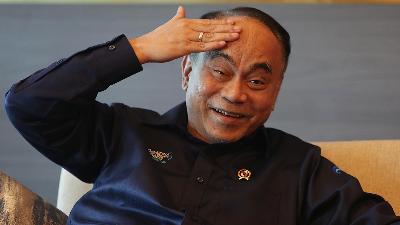
Tempo’s interview with Minister of Communication and Informatics Budi Arie Setiadi about Jokowi’s campaign before the end of his tenure.

Jokowi’s campaign promoting his successes is considered as not portraying actual conditions. Customary communities are among the victims of his administration.

Trade Minister Zulkifli Hasan on the issues ranging from sea sand export policy to Prabowo Subianto’s bureaucratic management style.

There is a strong aroma of politics around the appointment of Saifullah Yusuf as Minister for Social Affairs. President Jokowi should focus on dealing with the problems of poverty.

The willingness on the part of Muhammadiyah and Nahdlatul Ulama to accept mining concessions will turn into a problem. This is prone to corruption and could lead to horizontal conflicts.

Muhammadiyah cadres and administrators are divided in their response to the mining concession. There are whispers from the government and the entrepreneurs.
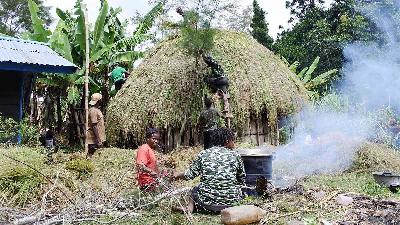
The Papua conflict continues to rage during Jokowi’s administration. The fate of the refugees is neglected.
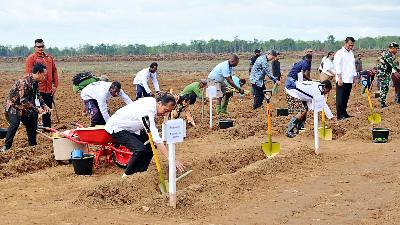
In a decade of Jokowi’s administration, deforestation reached 4.37 million hectares. This is partly attributed to national strategic projects in the food and energy sectors.
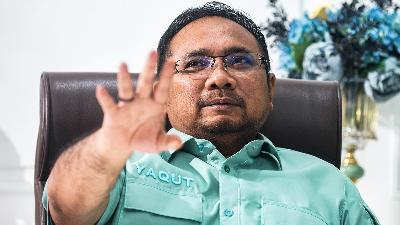
The DPR and the Religious Affairs Minister disagree regarding an additional quota of haj pilgrims. The DPR deems Yaqut Cholil Qoumas has broken the law.

The Ministry of Education, Culture, Research and Technology clarified the matter of the network of professor assessment teams. It is suspected that journals were engineered in addition to suspicious transactions.
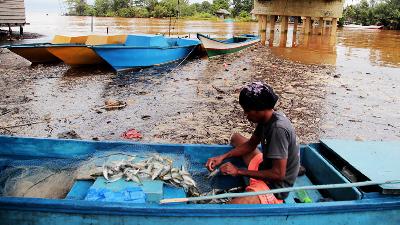
Indigenous people and villagers in Central Halmahera are facing clean water crisis. Community wells and river water are contaminated by nickel mining.

Communication and Informatics Minister Budi Arie explains the cyberattack on the Temporary National Data Center. He dismisses allegations of negligence.

Infinite Earth responds regarding the revocation of Rimba Raya Conservation’s ecosystem restoration permit.

The government grants mining concessions to religious organizations. What are the considerations behind the policy?
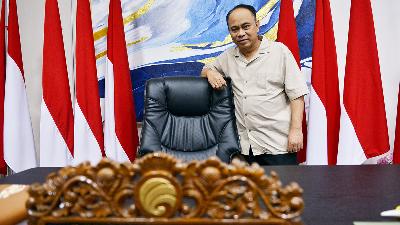
Communication and Informatics Minister Budi Arie Setiadi talks about the polemic over the planned revision of the Broadcasting Law and the Starlink Internet service.
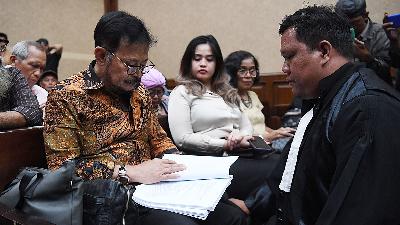
Agriculture Ministry high-ranking officials routinely took up collections to raise money for Syahrul Yasin Limpo from 2020 to 2023. They often used the treasurer’s cash account.

Prabowo Subianto intends to form a cabinet of 40 ministers. This will result in a bloated bureaucracy and wasted public money.

Illegal tin mining is rampant in the waters of Bangka Belitung. The environmental damage is much greater than investigators estimated.
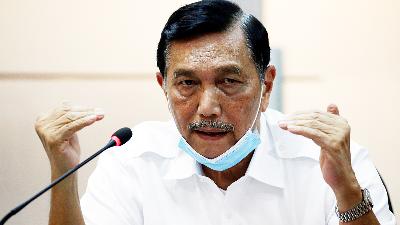
An interview with Coordinating Minister for Maritime Affairs and Investment Luhut Pandjaitan on mining permits for mass organizations and his relationship with Bahlil Lahadalia.
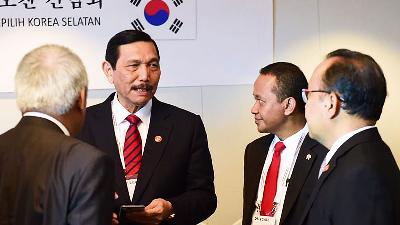
Luhut Pandjaitan and Bahlil Lahadalia discussed the allocation of mining permits. For the sake of delivering Jokowi’s promise.

The legalization of illegal mining and oil palm plantations in forest areas is rife with irregularities. This is plundering of natural resources using the Job Creation Law.
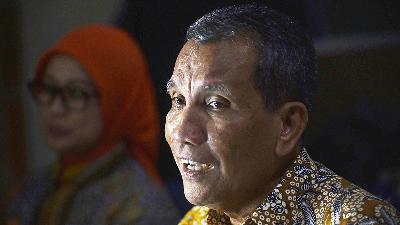
Corruption Eradication Commission’s Deputy for Prevention, Pahala Nainggolan, on the mechanism of administrative sanctions for companies mining illegally in forest areas.

Administrative fines for whitewashing illegal mining are deemed ineffective to battle environmental damage. The fines are also vulnerable to corruption.
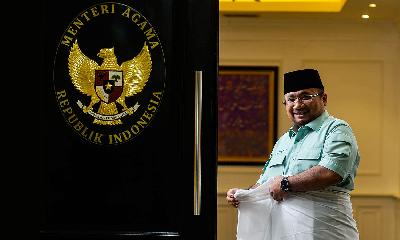
Religious Affairs Minister Yaqut Cholil Qoumas explains the regulation regarding the use of loudspeakers in mosques and outlines plans to ensure that religious affairs offices provide services for all faiths.

The declining trade surplus is the culprit of the rupiah’s weakening recently. Partly, it is the fruit of the government’s own doing.

The Attorney General's Office is investigating alleged corruption over tin mining permits in Bangka Belitung. The investigation must also reveal the backers.

Three Timah directors become suspects in a tin mining corruption case in the Bangka Belitung Islands. Estimated losses sustained by the state amount to Rp217 trillion.

Investment Minister Bahlil Lahadalia has revoked mining permits and then reissued them. There are indications of illegal buying and selling of permits.

Deforestation and illegal nickel mining continues in Halmahera. It became widespread after Minister Bahlil revoked some mining licenses.

Allegedly, there are tributes to Investment Minister Bahlil Lahadalia. This coverage is supported by International Media Support
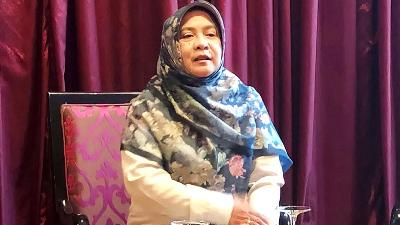
An interview with the Ministry of Environment and Forestry’s Director-General of Climate Change Mitigation Laksmi Dhewanti about the REDD+ program.
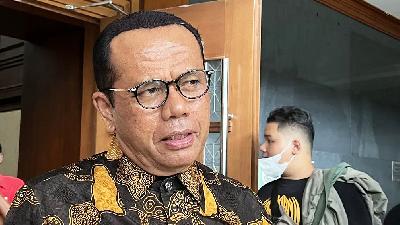
An interview with Juniver Girsang, the lawyer of Fajar Bhakti Lintas Nusantara directors, on the role of the Coordinating Minister for Maritime Affairs and Investment Luhut Pandjaitan in the internal dispute of a nickel company.

Ministry of Religious Affairs and Ministry of Agriculture’s right of reply on support for presidential candidates.

What are the functions of the cabinet minister’s special staff?

The Palestinian homeland neither originates from the distant past, nor is it a hope for the future.

A number of President Joko Widodo’s ministers campaign for their respective political parties ahead of the 2024 elections. How to scrutinize a possible misuse of state facilities?

Helmut Hermawan, who admitted to bribing Deputy Justice and Human Rights Minister Eddy Hiariej, is indicted in 11 criminal cases. It is the fallout from fighting over company stocks.

The water of the Sagea River in North Maluku is polluted by nickel mining. The environmental danger is becoming more real as the price of nickel on world markets plummets.

Sagea River is polluted as a result of deforestation by a number of nickel mining companies. Its water is no longer safe for drinking.

Syahrul Yasin Limpo is the sixth of Jokowi's ministers to be caught up in a corruption case. This is a sign of failure in the recruitment of cabinet members.

The appointment of the Environment Ministry Director-General of Planning appears to have been made based on a forged signature. His track record is also controversial.
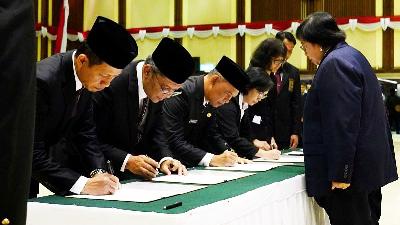
The signature of Sarwono Kusumaatmadja was used to validate the names of candidates for echelon-I officials of the Environment and Forestry Ministry. The announcement letter was issued when he was hospitalized in Malaysia.

Former government employees at the Foreign Affairs Ministry are demanding the disbursement of unpaid wages. How did it come to happen?

The National Genome Center set up in 2018 is gone. Does it change into the Biomedical and Genome Science Initiative of the Health Ministry?

A former campaign volunteer for President Jokowi is named a suspect in relation to an illegal nickel mining worth Rp5.7 trillion. A crooked syndicate that must be investigated.

Businessman Windu Aji Sutanto is caught up in a case of illegal nickel mining at the Mandiodo Block. He is known as a broker for arranging the outcomes of legal cases.

The mining downstreaming policy gives rise to issues. Mineral processing has not been optimal without processed materials being absorbed by manufacturing industries.

Minister Mahfud Md’s statement regarding a loan claim by Jusuf Hamka could be considered influence peddling. This is treading on very thin ice.

Through people close to him, Agriculture Minister Syahrul Yasin Limpo allegedly received tributes to fund his personal needs.
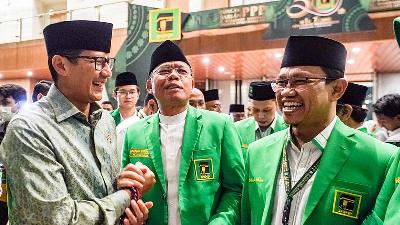
Sandiaga Uno and Erick Thohir are cozying up to political parties. Even opposition parties have been lobbied to support the current administration.

Small islands face the threat of disappearing under the water as a result of the sand mining. This worsens the abrasion caused by rising sea levels.

Sand mining exacerbates threats for smaller islands. It creates environmental damage and less catch for fishermen.

Police seized a Lamborghini Aventador with a fake license plate from a Russian tourist. The car disappeared twice.
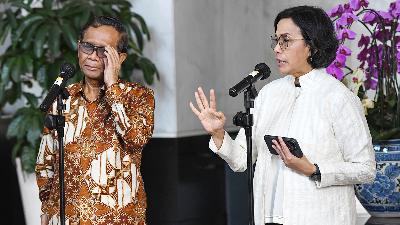
A summary of the week’s news on the huge transactions discovered in the finance ministry, the transfer of the Haris-Fatia case to the prosecutor's office, and the verdict received by the Kanjuruhan Tragedy defendants.

An investigation by Tempo found illegal nickel mining by people claiming to be close to the authority.
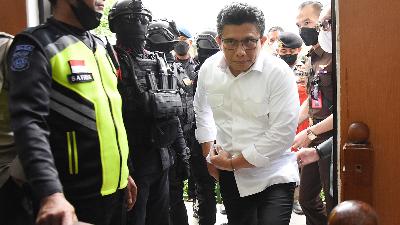
Ferdy Sambo, who is currently facing trial in the case of the killing of his adjutant, is suspected to be connected to an illegal mining bribery case involving Ismail Bolong.

Discussions to decide the provincial minimum wage for 2023 get hot. Workers are lobbying the president to issue a discretion, while employers are suing manpower minister regulation.

Minister Erick Thohir promises to ban former corruptors from becoming directors of state-owned enterprises. Mere gimmicks are inadequate for a comprehensive cleanup of state-owned enterprises.

Nadiem Makarim has outside teams attached to some directorate-general offices at the Ministry of Education, Culture, Research and Technology. Consisting of about 400 people, these shadow organizations create waves inside the ministry.
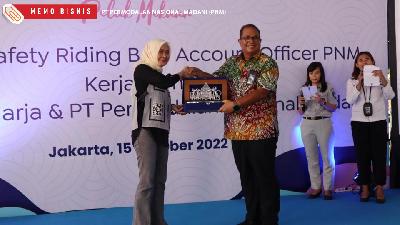
PT PNM put 100 Jakarta Branch Account Officers as training participants so they can be more aware and obey the traffic rules. #Infotempo

Barring the entry of five foreign researchers underlines the anti-science and anti-criticism stance of Environment and Forestry Minister Siti Nurbaya. This is a danger for the environment.
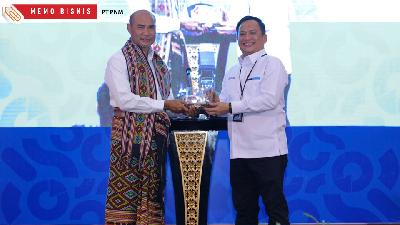
The training and provision of NIB is one of the supports for MSMEs in advancing the people's economy. #Infotempo

The Agriculture Ministry has a letter on the right of reply to Tempo’s report about the procurement of the foot-and-mouth disease vaccines.

Through this training and mentoring, PNM builds emotional relationships and provides support to customer assistants. #Infotempo

Through this training and mentoring, PNM builds emotional relationships and provides support to customer assitants. #Infotempo
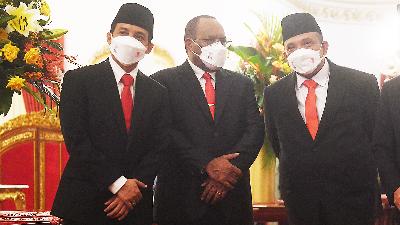
President Joko Widodo again chooses deputy ministers from political parties. It is part of his accommodation politics.

The attorney general names Lin Che Wei the fifth suspect in the graft case surrounding the export of crude palm oil and its derivatives. Investigators are also looking into Trade Minister Muhammad Lutfi’s role in the affair.

The police are investigating Rudy Salim following videos of the sale of a Lamborghini Huracán to a binary option fraud suspect, Indra Kenz. The car should not have been sold because it was imported using the ATA Carnet facility.
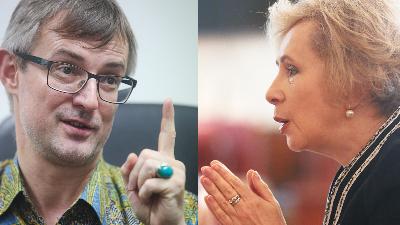
Russian Ambassador to Indonesia, Lyudmila Vorobieva, claims that the assault on Ukraine is carried out to prevent the country from being used as a weapon to attack Russia.
Meanwhile, Ukrainian Ambassador to Indonesia, Vasyl Hamianin points out that it is wrong for Russia to use such fear as an excuse to invade Ukraine and kill civilians in the process.

Letters on a note to Minister Nadiem Makarim, digital detoxification and the US-China tension.

The inspectorate-general at the ministry of education, culture, research and technology backs the accusations of plagiarism against the rector of the Semarang State University. This is a stain on the face of the education system.
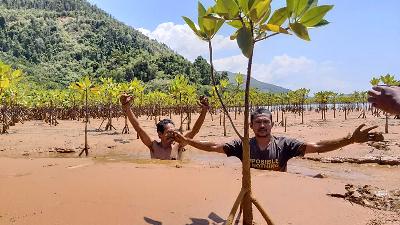
Local communities protested against Aneka Tambang for polluting the mangrove area in Tanjung Moronopo, East Halmahera North Maluku, with waste from its mining operation. The mine is changing both the waters and the lives of fishermen.

Objection of the Ministry of Villages Regarding a Government Official Suspected of Brokering Personnel Recruitment.
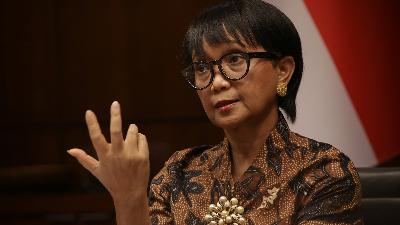
ASEAN leaders finally came to a number of consensus, such as finding a peaceful solution through dialogue and sending a special envoy to Myanmar. Further steps are still needed. Tempo interviewed Indonesian Minister of Foreign Affairs, Retno marsudi.

Ministry of Villages, Disadvantaged Regions, and Transmigration writes a response to the article titled Fees for Positions in Kalibata in Tempo English April 12-18, 2021 issue.

Taman Mini reflects the view that life is only the status quo—as though in every phenomena, every difference, there is only the everlasting.
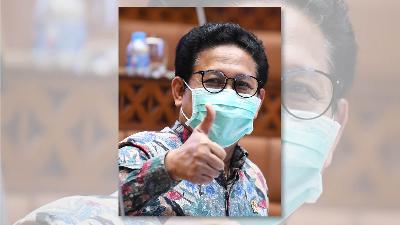
Alleged trading of postings within the Villages Ministry shows a major flaw in the practice of good governance. Placement of politicians in ministries are most often problematic.
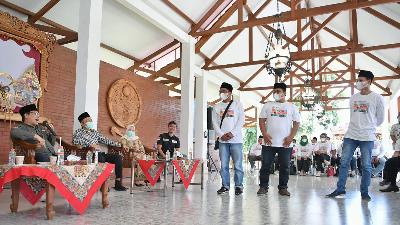
Problems abound for village assistants. These problems are in part due to structural changes at the villages ministry.

Julia Suryakusuma received an award from the Kingdom of Belgium for her struggle to voice human rights through writing. She is uncomfortable with being called a feminist.

The ministry of health clarifies a sentence on the article Vaccine Opportunist in Tempo English, 22-28 March, 2021 issue.

Several rectors are still in office despite having committed plagiarism. They have the support of education ministry officials

Health Minister Budi Gunadi Sadikin

Coordinating Ministry for Maritime Affairs and Investment conveys objection to the report of Dragons in Trouble in Tempo English of January 4 edition.
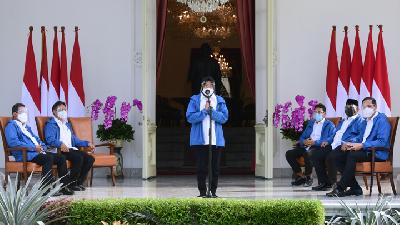
Some new cabinet ministers were selected in line with the wishes of President Joko Widodo. Candidates for the cabinet reshuffle suggested by political parties were pushed aside.

The Corruption Eradication Commission (KPK) should not allow investigation into the case of embezzlement in the social assistance program to only stop at former Social Affairs Minister Juliari Peter Batubara.

Some of the kickbacks related to the export of lobster larvae allegedly paid to the former minister of maritime affairs and fisheries are believed to have been passed on to his associates. Investigation should not stop with Edhy Prabowo.

People close to South Sulawesi Governor Nurdin Abdullah are suspected of enjoying preferential treatment for getting licenses for sand mining businesses.

A Mid her desperate hunt for Covid-19 vaccines, Foreign Minister Retno Lestari Priansari Marsudi managed to successfully led Indonesia’s presidency over United Nations Security Council (UNSC) in August.

Optimism is brewing in the financial markets, while the real sector is signaling a slowdown. A heavy burden for the incoming president.
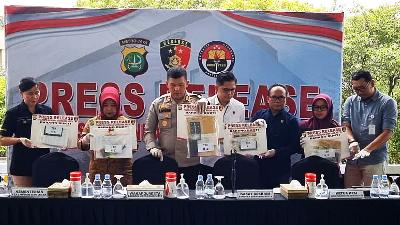
Producers of child pornography content entice their victims with cash and online game vouchers. They also approach victims’ families.

Sony Karsono’s Sentimentalisme Calon Mayat (The Sentimentalism of a Future Corpse) is Tempo’s 2023 Book of Prose.

Jokowi’s political maneuvers erode his political legitimacy. While Indonesia might be exposed to a global crisis spill over.

The heat of political tensions and China's economic weakness is dampening financial market sentiment in Indonesia. This could persist for a while.

Cable wires hanging over the streets claim numerous victims in different regions. Protection for the victims is often unclear.

The Attorney General’s Office responds to the report on the restorative justice for sexual abuse victims.

The National Commission on Violence against Women finds that restorative justice often harms victims. There are alleged violations within the police and the prosecutor's office.
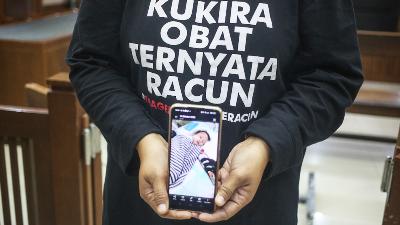
Families of victims of acute kidney injury are anticipating compensation from the government. It is the extended impact of poor coordination of government institutions.
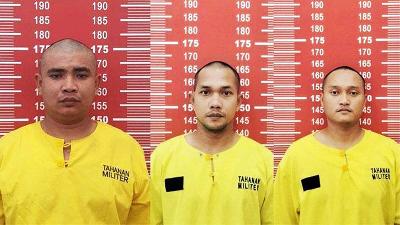
A Presidential Security Detail (Paspampres) member and two TNI members kidnapped and tortured a cosmetic trader to death. There were presumably eight other victims.

Five women who tenaciously supported victims of sexual violence have been chosen as Tempo’s People of the Year 2022. They fought hard to demand justice for these victims.

The investigation into the Kanjuruhan Stadium tragedy is not targeting any new suspects. There are intimidations toward families of the victims.

The ministry of education must immediately punish any lecturer guilty of sexual abuse at Riau University. The priority must be the protection of victims.

Victims of sexual violence have the right to restitution in damages. Its mechanism is unclear.

A number of institutions are against the proposed government regulation on maritime security. Sectoral egos provide opportunities for illegal levies.
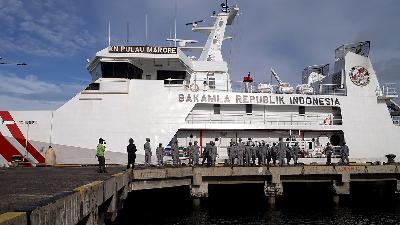
The government is ready to launch a draft regulation regarding maritime security. There is friction among government institutions to take care of the matter of Rp5.5 trillion a year in illegal retribution fees at sea.

The South Sulawesi Regional Police assigns the Luwu Timur District Police to investigate the suspected sexual violence against three children. There is new evidence in the case.

Patimban Port is designed through the concept of a sustainable, green, smart and integrated international port.

The plan to operate Patimban Port raised concerns of a market war with Tanjung Priok Port. Pelindo II has chosen to focus on improvements.

The victory of the CT Corp consortium in the pre-qualification for the tender to operate the Patimban Port was planned from the outset. There are indications that it is a way to return favors to supporters of the government.

The government has made it easier for compensation to be paid out to victims of terrorism. But it is still not yet on the side of the victims of human rights violations.
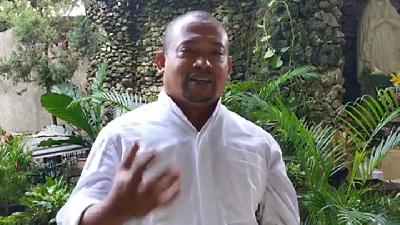
In early February, not long after taking the role of head priest at St. Herkulanus Parish in Depok, West Java, Yosep Sirilus Natet was faced with a case of sexual violence against altar boys. At first, there were two victims.
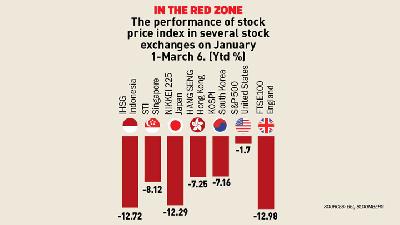
IT is increasingly becoming clear that the health of global financial market is entirely hanging on an infusion of stimulus from the central bank.

The man assaulted in Kampung Bali was not Andri Bibir as claimed by the police. Someone close to the victim has spoken.

Whomever fell as victim in the May 22, riots—the mischief-mongers as well as the picketers—all deserve to obtain justice.

Wendelina Olin has never ceases to help and defend women and children subjected to violence in North Timor Tengah.

The testimony of a rape victim at the Workers Social Security office may well help other women to muster up the courage to speak out.

The Supreme Court leveled a guilty verdict against a teacher who was a victim of sexual harassment in Mataram. Many opposed this verdict.

Dozens of invaluable items at the Jakarta Maritime Museum were destroyed in a fire. The building is no longer in appropriate condition for a maritime museum.

President Joko Widodo's dream of revamping the maritime sector has begun to take shape. After successfully launching six sea toll routes over the past year, the government is set to add seven new routes this year. The maritime connectivity program to minimize disparity in prices of basic commodities between Indonesia's main islands and remote areas has proven successful and has cut down logistic costs by 25 percent. The success can also be seen in the number of large foreign container vessels that now dock directly at the Tanjung Priok Port, instead of in Singapore.

The governments of Indonesia and Germany have agreed to start the process of initiating a Memorandum of Understanding (MoU) on maritime issues and on vocational education at the Indonesia-Germany Bilateral Steering Committee (BSC) in Jakarta on April 17.

Miryam S. Haryani, member of the Hanura Party and the House of Representatives' (DPR) government commission for the 2009-2014 period, withdrew her entire testimony from the Corruption Eradication Commission's (KPK) official investigation records with regards to the electronic identity card (e-KTP) project. "I withdrew [my testimony] because it was not true," she said at a Corruption Court hearing on March 23.

A key witness for the KPK has retracted her testimony. The Hanura politician felt pressured after revealing the bribery trail of the e-KTP case.

PRESIDENT Joko Widodo and his Sri Lankan counterpart Maithripala Sirisena oversaw the signing of a Memorandum of Understanding (MoU) in maritime issues and fisheries and a joint communique on illegal, unregulated and unreported (IUU) fishing by the Indonesian and Sri Lankan maritime and fisheries ministers. The President believes the MoU will strengthen cooperation in combating IUU fishing.

Having received little attention from the government, terror victims hope to see the law revised.

Saying that he was out of the country, Tomy Winata replied to an interview request by text message on Wednesday last week. Tomy said everything related to the Tual case was being handled by the communications director of Maritim Timur Jaya and its legal team. Tempo interviewed Maritim lawyer Desrizal, who was accompanied by six Artha Graha employees, in a private room at the Batik Kuring restaurant in the Sudirman Central Business District in Jakarta last week.
Why did Maritim take issue with the police search?
The police did not inform us they wanted to search the premises. They showed a search warrant for a preliminary investigation of a number of cases, involving corruption, cybercrime and human trafficking. Narcotics were mentioned as well. The letter was signed by Budi Waseso. A preliminary investigation is supposed to be limited. You cannot arrest or question people just like that. It was only later that we found out the investigation order was for cases on corruption related to the administration of visas on arrival.

Transportation Minister Ignasius Jonan has a well-grounded reason to delay the opening of the new Terminal 3 Ultimate at Soekarno-Hatta International Airport: It has failed to meet safety standards.
The delay has dashed the hopes of people who wanted to see a new terminal completed before the Lebaran holidays. At a glance, the magnificent structure adorned with traditional ornaments from across the archipelago looks quite immaculate. Containing 28 domestic and international gates, the terminal is even touted as being on par with Singapore's Changi Airport. Having the capacity to accommodate 25 million passengers a year, the Rp7 trillion terminal will become a significant alternative to the Soekarno-Hatta terminals that these days cater to an overwhelming 60 million travelers. This is perhaps the reason behind Coordinating Minister for Maritime Affairs Rizal Ramli's insistence that President Joko Widodo launch the terminal's opening before Lebaran.

Peter Popham's book The Lady and The Generals published last March tells the story of Aung San Suu Kyi getting upset in an interview with BBC journalist Mishal Husain two years ago. Their discussion soured after the journalist asked about Suu Kyi's silence about the 2013 persecution of Rohingya Muslims in Rakhine State.
She initially tried to ward off the question by not really answering it. Both Muslims and Buddhists, Suu Kyi said, were victims. Husain persisted, saying it was the Rohingyas who were being persecuted in Rakhine, not Buddhists. After the interview, Suu Kyi was heard muttering, "No one told me I was to be interviewed by a Muslim."

Optimism is evident in Jakarta's financial markets, be it stocks, bonds or the rupiah currency. The Jakarta Composite Index rose 4.8 percent since the start of the year. In dollar terms, the rise has even reached a high 9.7 percent. Rupiah is also appreciating. Until last week, the selling price for US dollars quoted by Bank Indonesia has dropped 5.9 percent in the first two and a half months of 2016.
Indeed, global investors have limited choice investing in emerging markets. China is still limp. Its 2016 February exports fell by 25.4 percent, compared to a year ago. Meanwhile, India's economy, which grew 7.5 percent in 2015, seems to have peaked. Investors need alternatives, and it looks like Indonesia is once more on their radar screen.

With a 1.49 percent annual growth rate, Indonesia's current population of more than 250 million is expected to surpass that of the United States by 2043, possibly becoming the third most populous country after China and India. Despite a national family planning program in place since 1967, Indonesia continues to struggle with various sociocultural constraints that prevent it from becoming more effective and efficient. Such issues emerged during the recent International Conference on Family Planning in Nusa Dua, Bali.
On the sidelines of the biennial conference, Tempo English contributing editor Cory Rogers spoke to Dr. Babatunde Osotimehin, the current executive director of the United Nations Fund for Population (UNFPA). Dr. Osotimehin, a Nigerian national who is serving his second term as head of UNFPA, shared his views on how empowering women through sexual and reproductive health rights is a key to unlocking Indonesia's development potential. Excerpts of the interview:

This is the story of death. It is begun with somebody's death and ends with your own death. Yes, your death. No need for surprises," Faisal Oddang opens his story in his maiden novel Puya ke Puya. Death is the frame of the whole narrative, binding the subplots throughout the 218-page novel.
Yet, death here is not described in fear or anxiety. Faisal sets it with the background of the Toraja community that views death as something intimate. "Most Torajans celebrate death and keep it as close as possible in their memories," writes Faisal.

A woman in the later stages of life, a youth whose passions are just beginning to stir, live their daily routine in a large, empty house. What comes to pass?
Teddy Soeriaatmadja's third film About a Woman, following Lovely Man and Something in the Way, is the latest in his series of movies about people in large cities whose lives change after they meet someone. All three films have protagonists who long for intimacy amid emptiness and seclusion.

Demand that the government accept responsibility for the 1965 atrocities is being revived. "They burned my body with cigarettes," Tintin Rahayu told the courtroom at Nieuwe Kerk in The Hague, the Netherlands, before pausing to compose herself. "In the interrogation room, I was beaten, and at camp in the military headquarters in Cebongan, (Sleman, Yogyakarta), I was trampled on." As Tintin began to sob, the courtroom fell silent.
Tintin was one of many witnesses to testify at the International Peoples' Tribunal 1965 in the Netherlands last week. Organizers said the event aimed to expose the gross human rights violations that occurred following the events of September 30, 1965, as well as highlight the implications for victims of violence.

August 2015 marks a milestone in Singapore's history: the island state turns 50. Big and small events will be held throughout the country as part of the jubilee. But this will be the very first time that Singapore celebrates its anniversary without its revered and influential founding father, Lee Kuan Yew. "Mr. Lee retired as Prime Minister in 1990. He has prepared well and Singapore is set to take further steps forward." said Prime Minister Lee Hsien Loong, in answer to Tempo's questions.
Prime Minister Lee, who is popularly known as BG (Brigadier-General) Lee, follows in the footsteps of his father Lee Kuan Yew, the nation's first president and his predecessor, Goh Chok Tong. "I'm a third generation leader," said Lee. He leads a small nation of just 5.5 million people yet with the highest gross domestic product (GDP) per capita in the Association of Southeast Asian Nations (ASEAN) region and the top third in the worldover US$56,000. Given its sizesmaller than Jakartaits lack of natural resources and its young age, Singapore's story is a remarkable one.

This nation must not take lightly the intimidation suffered by Corruption Eradication Commission (KPK) investigator Afief Yulian Miftach. The police, the institution responsible for this, must arrest the person responsible. If not, the intimidation will not only continue, but could really hurt Afief.
Last Sunday, the KPK investigator discovered an object resembling a bomb near the fence around his house. He spotted it when he, his wife and child, were about to enter their house in the Mediterania housing complex in Bekasi, West Java. Suspicious of the item, Afief called the police. The move by the police, who then sent a bomb disposal team to disable the 'device', deserves praise.

Maritime Affairs and Fisheries Minister, Susi Pudjiastuti has earned praise for her resolve in eradicating illegal fishing. However, quite a few business people feel they became victims of her campaign, even though they say they have been law-abiding businesses all this time. They claim the Minister is doing more harm than good, the losses incurred as a result of her campaign reaching up to Rp3 trillion, as she applies the same treatment equally to all concerned parties. At the Tempo office last week, she explained her position, maintaining that everything her ministry implemented was according to existing laws and regulations.
What is the reason for extending the moratorium on foreign fishing vessels to another six months?

The Executive Director of United Nations Population Fund (UNFPA), Doctor Babatunde Osotimehin, who visited Jakarta for the World Economic Forum on East Asia last week, led a discussion on how Indonesia can capitalize on its large youth population. Sadika Hamid, Amanda Siddharta and Edward Stephens from Tempo English interviewed Osotimehin, the former Nigerian Health Minister.

Anton Hendranata*
The aura of optimism emanating from the revised budget 2015 is quite apparent. On the 2015 economic growth, the government assumption is set at 5.7 percent, higher than the analysts' consensus of 5.35 percent. It is understandable that government would be more optimistic, considering they have set a longer-term growth target of 7 percent.

FOR many Indonesians, 2015 began on a positive note: subsidized fuel prices had fallen with global oil prices. Premium gasoline dropped from Rp8,500 to Rp7,600 per liter, and automotive diesel oil went from Rp7,500 to Rp7,250 per liter.
With that in mind, President Joko Widodo was optimistic 2015 would bring improvements for the Indonesian economy, with the government able to cut subsidies and free up funds. "This money can be diverted to build infrastructure such as reservoirs, irrigation, toll roads and railways outside of Java," Jokowi said.

ONE month after he was appointed coordinating minister for maritime affairs and fisheries, Indroyono Soesilo's working hours have stretched late into the night. Perhaps it's because he is, so far, the only official coordinating minister. "I'm the only who has received his marching orders, the other coordinating ministers are still awaiting theirs," he said when he met the Tempo team two weeks ago.
Indroyono's office, located at the Agency for the Assessment and Application of Technology (BPPT) building in Central Jakarta, is not unfamiliar to him. From 1997 to 1999 he worked there as the BPPT deputy director in charge of natural resources. Today, he occupies the huge office of the former BPPT chairman, Bacharuddin Jusuf Habibie, the last vice president in the New Order era and the first president to launch the reformasi era. "No one dares to occupy this office, they're all afraid," he joked, in explaining how he ended up there.
In the media flurry of profiling President Joko Widodo's new cabinet members, Indroyono appears very subdued and conservative compared to the flamboyant and unconventional Maritime Affairs and Fisheries Minister Susi Pudjiastuti. But there's no question that Indroyono is the man to watch as he is the one tasked with implementing the major changes charted by President Jokowi.

THE newly appointed minister for maritime affairs and fisheries appeared in casual clothes, although she wore a long skirt down to her ankles. She admits to dressing more than she ever did before embarking on her new job. "I must now wear clothing that covers the tattoo on my leg," she said, in explaining her sartorial change. Some things don't change however, as she still insists on wearing 10-centimeter high-heeled shoes and wedges.
Susi is indeed a refreshing change in a society which usually demands protocol and correctness from officialdom and the elite. Yet she has inspired others to be true to one's own self and be proud of it. Just before the ceremony to announce President Joko Widodo's new cabinet members, Susi was approached by Rosita Barack, wife of politician Surya Paloh, who told her, "Ibu Susi, you rock. I really like your tattoos and I have some too." In fact, Susi's tattoo is an image of a flaming bird snaking up her leg, something she acquired when she she was 27 years old.

THE vote on the Local Elections Bill by the House of Representatives (DPR) is the most blatant example of public betrayal by the so-called 'people's representatives'. The collusion between political parties, particularly those affiliated with Prabowo Subianto during his presidential election bid last July, has turned back the hands of time, putting the people's sovereignty back in the lap of the oligarchies.
The victory of the Red and White Coalitionwho support the election of governors, regents and mayors by regional legislative assembliesat the DPR put an end to direct elections that began nine years ago. Now that the Bill, which was the government's initiative, has been passed into law, party politicians will have the power to determine who will lead the 34 provinces, 410 regencies and 98 municipalities throughout Indonesia. And this number may grow because politicians continue to establish new autonomous regions.

During the final rounds of the campaign, Joko Widodo-Jusuf Kalla's campaign team has had its hands full trying to fight off the serious smear campaign launched by the opposing side. They tried to reinforce the support in areas like West, Central and East Java. Despite the various propaganda, campaigner Andi Widjajanto said he was optimistic the Jokowi-Kalla ticket, endorsed by the Indonesian Democratic Party of Struggle (PDI-P), the National Awakening Party (PKB), the National Democrat (NasDem) Party and the Justice and Unity Party (PKP), will win the election next Wednesday. He spoke to Tempo reporter Kartika Chandra on the tactics being used during the campaign. Excerpts of the interview:
How damaging has the semar campaign been on Jokowi?
It's been significant. The slanders forced us to spend more attention and energy to anticipate them, like forming a special team to track them down. There were no less than 28 lies or rumors systematically disseminated to bring down Jokowi, and which we had to manage, one by one. That took a lot of our time. And we lost a lot of voters, particularly among the undecided.
What kind of attacks?

Freeport and Newmont refuse to adhere to the Law on Mineral Ore and Coal Mining. It's time the government takes a firm stand.

The judicial review submitted by victims of Group C was granted by the Supreme Court. The president must quickly restore their rights.

Pratima objects are believed to reflect the nature of the Balinese gods. Thieves from Buleleng have been melting them down for gold.

Ridwan's research about Mandar's maritime culture has earned him recognition all over the world. Despite not finishing his studies, his books have become references for experts.

The investigation into the embezzlement of Optima has gone back and forth between the prosecutors and the police, who maintain the criminal and civil cases should proceed separately.

The Shiite leader whose Islamic boarding school was burned by a mob should be treated as a victim. Judges have no right to judge the beliefs of an individual.

Kambuna gas reserve in North Sumatra is not as big as earlier estimated. Local industries are complaining of falling supplies.

Ba’asyir was sentenced to 15 years in prison for supporting illegal military training in Aceh. His aides’ testimony ensured a guilty verdict.

Amid the various charges, the Judicial Mafia Task Force has set its sights on other actors in the tax scandal. It helped Arafat to write a personal testimony.

Japan is to build a global maritime surveillance system in Indonesia. The system will include Tarakan (East Kalimantan), Manado (North Sulawesi), Bali, and Kupang (East Nusa Tenggara). More developments continue in eastern Indonesia.

The written testimony by Antasari Azhar cannot be used as evidence because it was based on another’s account. He is liable to five years in prison for meeting with a suspect involved in a corruption case.

SBY and Boediono won the elections in a single round. This is a good time for the defeated candidates to prove their sense of graciousness.

The government will eventually disburse an economic stimulus package in 2009 worth Rp73.3 trillion. More than 85 percent will be washed away in fiscal stimulus forms. But business groups are pessimistic that the package will be able to reawaken the economy and the business world.

The government is to pay out stimulus funds from April to December. Could there be a political motivation in this?

Liem Koen Hian was the founder of the Indonesian Chinese Party during Dutch colonial times. Ironically this Indonesian nationalist passed away as a foreigner.

Insana women in Timor Tengah Utara work as service providers and teachers.

Lapindo tries to persuade mudflow disaster victims to relocate, bringing land brokers to the scene.

Reports of violence by City Public Order officers have been on the increase. But for as long as no legal action is taken there will be more victims.

Tasikmalaya begins relocating victims of the Java tsunami. But Ciamis still awaits assurances of funding from the central government.

The Regent of Kutai Kartanegara claims he is not involved in Governor Suwarnas corruption case; in fact their relationship has been hostile for some time.

A Makassar Human Rights Court is due to deliver its verdict over the Abepura case, next Thursday. But reports have surfaced that the court will not award compensation to the families of human rights victims.

The government has opened an opportunity to mediate with Newmont. Compensation for the victims and environmental recovery must be a priority.

Scores of condemned men currently await their fate on Indonesias death row. Some spend their remaining days growing vegetables and selling them. Others dream of marrying. Death, in whatever form, is not easy to confront. A number of prison inmates have actually dieddue to illness or other causeswhile waiting to face the firing squad. And death becomes ever so intimate, says poet Subagio Sastrowardoyo. To these condemned men, the angel of death is their close companion.

Ali Imron, one of the accused Bali bomb makers, was surprised that the three bombs exploded at the same time. He was perhaps not so surprised to be arrested.

IBRA has treated business tycoons like highly reliable investors, but it has also given them an ultimatum. What's behind all this?

To face the negative impact of the Bali bombing, the government plans to increase the economic stimulus to Rp5.9 trillion. In line with that, various assumptions serving as the basis of the 2003 Draft Budget will also be changed.

The Business Competition Supervisory Commission has suffered another loss at the hands of Indonesia's courts; a decision causing legal observers to question the use of antimonopoly legislation.

Akbar Tandjung's testimony conflicts with the testimony of co-defendant Rahardi Ramelan. Unfortunately, former president B.J. Habibie didn't show up to resolve the controversy.

People are looking forward optimistically to year 2002, although clashes between community groups are most feared.

The death sentence has been demanded for three men allegedly involved in the Poso III riots. Will the judge bow to public sentiment?

In the end, those who fall victim to violations of the regulation are women.

The following testimonies are in response to important questions concerning the Bulog scandal made before House Commission III of DPR and testimonies contained in police examination reports obtained by TEMPO.
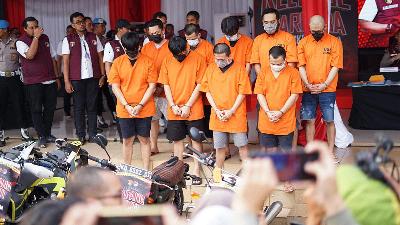
Hendra Sabarudin’s drug network distributed methamphetamine from Tarakan prison starting in 2017, allegedly aided by police and prison guards.

Sheikh Burhanuddin Ulakan spread Islam by establishing a surau. The first instance of a pesantren education methodology.

She was the first girl from Kampung Belakang to marry a Taiwanese man. Her good life in Taiwan has attracted other girls in her village to follow in her footsteps.

TAIWANESE men are coming in droves to Kampung Belakang to find girls of poor families of Chinese descent in the poor village west of Jakarta, to marry. With the help of molang, the matchmakers, and a dowry of only Rp5 million, they could return with a girl of their dreams after a brief marriage process known in Chinese as sangjitan. Poverty is driving girls in the village to take a short cut out of privation. Some make it but many end up with no future in a foreign land. Tempos Istiqomatul Hayati traces the quickie marriage practice from Kampung Belakang to Taiwan.

Mounting sedimentation of Segara Anakan is blamed for the massive flooding of coastal villages in Cilacap as local authorities struggle to save the lagoon.
Independent journalism needs public support. By subscribing to Tempo, you will contribute to our ongoing efforts to produce accurate, in-depth and reliable information. We believe that you and everyone else can make all the right decisions if you receive correct and complete information. For this reason, since its establishment on March 6, 1971, Tempo has been and will always be committed to hard-hitting investigative journalism. For the public and the Republic.